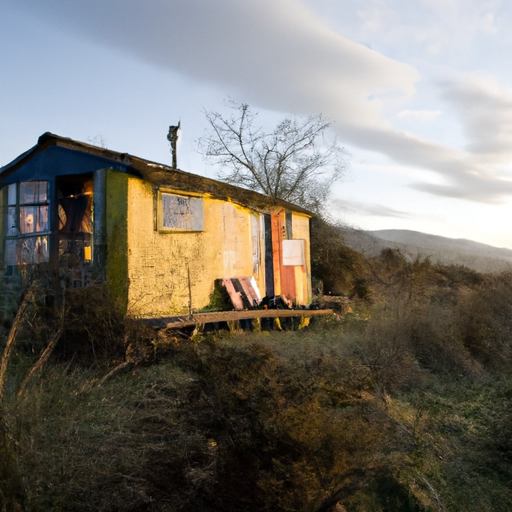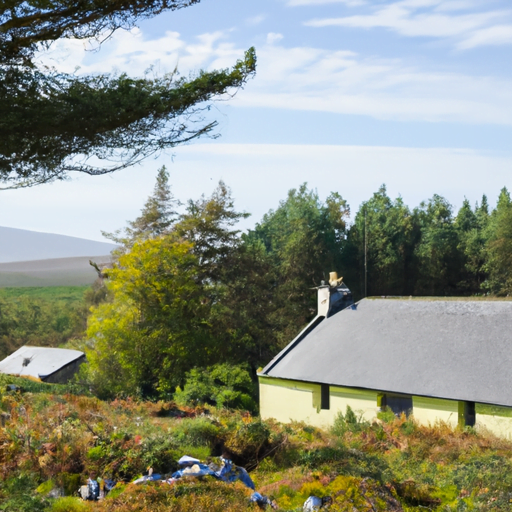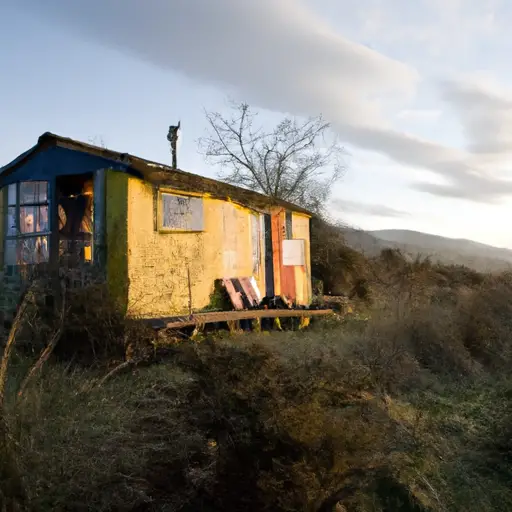So, have you ever wondered what it would be like to live off-grid? You know, completely disconnected from the electric grid, relying on self-sustainable and renewable sources of energy? Well, let me tell you, it’s a topic that has been gaining more and more attention lately. And if you’re specifically interested in off-grid living options in Scotland, then you’re in for a treat.
Now, Scotland might not be the first place that comes to mind when you think about living off-grid, but you’d be surprised at the options available in this beautiful country. From remote cottages nestled in the hills to sustainable communities powered by wind and solar energy, Scotland offers a unique and rewarding off-grid experience. In fact, there are even initiatives in place to encourage and support off-grid living, making it easier for those who are passionate about self-sustainability to make their dream a reality.
In this article, we’ll explore the various off-grid living options in Scotland and delve into the challenges and rewards of this lifestyle. So, if you’ve ever been curious about cutting ties with the mainstream and embracing a more self-sufficient way of living, stick around and learn more about off-grid living in Scotland. Whether you’re interested in the rugged beauty of the Highlands or the tranquility of the Scottish islands, there’s something for everyone in this off-grid paradise.

What is Off-Grid Living?
Definition of Off-Grid Living
Off-grid living refers to a lifestyle where individuals or communities are completely self-sufficient and do not rely on public utilities such as electricity, water, and gas. Instead, they generate their own power, collect and treat their own water, and manage waste independently. This lifestyle often involves using renewable energy sources, adopting sustainable practices, and minimizing reliance on external resources.
Benefits of Off-Grid Living
There are several benefits to choosing off-grid living. Firstly, it allows individuals to reduce their environmental impact by using renewable energy sources and practicing sustainable living techniques. Off-grid living also promotes self-sufficiency, as individuals develop skills and knowledge to provide for their own needs without relying on external systems. Additionally, this lifestyle offers a sense of freedom and independence, as individuals are not tied to utility bills or the constraints of a modern lifestyle. Finally, off-grid living can foster a stronger connection with nature, as individuals rely on natural resources and develop a deep appreciation for their surroundings.
Challenges of Off-Grid Living
While off-grid living can be rewarding, it also comes with its own set of challenges. One of the main challenges is the initial cost of setting up an off-grid system. Investments in solar panels, wind turbines, and other equipment can be expensive. Additionally, the management of resources, such as water and waste, requires careful planning and regular maintenance. Off-grid living also requires individuals to adjust their lifestyle and be mindful of their energy and water consumption. Furthermore, living off-grid can be isolating, as it often involves living in remote locations with limited access to amenities and services.
Off-Grid Living in Scotland
Current Off-Grid Living Trends in Scotland
Scotland has seen an increase in the popularity of off-grid living in recent years. Many individuals and communities are choosing to embrace this sustainable lifestyle as a way to reduce their ecological footprint and promote self-sufficiency. The beautiful landscapes and abundance of natural resources in Scotland make it an attractive location for those seeking an off-grid lifestyle.
Availability of Off-Grid Living Options
In Scotland, there are various options available for those looking to live off-grid. From remote cottages and cabins to eco-friendly communities, there is a range of properties that cater to different preferences and needs. Some individuals choose to convert existing properties into off-grid homes, while others opt for purpose-built off-grid dwellings. The availability of off-grid living options varies across different regions of Scotland, with more remote and rural areas offering more opportunities for an off-grid lifestyle.
Legal Considerations for Off-Grid Living in Scotland
Before embarking on an off-grid lifestyle in Scotland, it is important to consider the legal aspects. In Scotland, building regulations and planning permissions still apply to off-grid structures. It is crucial to obtain the necessary permits and approvals before constructing or modifying any buildings. Additionally, individuals must ensure their off-grid energy systems comply with safety standards and regulations. It is advisable to consult with local authorities and seek professional guidance to ensure legal compliance when living off-grid in Scotland.
Choosing Off-Grid Living in Scotland
Factors to Consider Before Going Off-Grid in Scotland
Before making the decision to live off-grid in Scotland, there are several factors to consider. Firstly, individuals must assess their energy, water, and waste management needs to determine the appropriate systems and technologies required. The climate and weather conditions in the chosen location also play a significant role in determining the viability of renewable energy sources such as solar power or wind turbines. Additionally, access to essential services, such as healthcare and groceries, should be evaluated to ensure a suitable location for off-grid living.
Suitable Locations for Off-Grid Living
Scotland offers a range of suitable locations for off-grid living. Remote areas in the Scottish Highlands and islands provide unparalleled tranquility and natural beauty. These locations often have abundant natural resources, making them ideal for generating renewable energy and managing water. However, it is important to consider the distance to amenities and services, as living in such remote areas may require additional planning and preparation.
Infrastructure and Utility Systems for Off-Grid Living
When choosing off-grid living in Scotland, it is essential to develop the necessary infrastructure and utility systems. This includes setting up renewable energy systems such as solar power panels or wind turbines to generate electricity. Advanced battery storage systems can store excess energy for use during times of low generation. Additionally, rainwater harvesting and treatment systems can be employed to ensure a sustainable water supply. Composting toilets and greywater recycling systems help manage waste effectively. Building and maintaining these systems requires careful planning, professional consultation, and regular maintenance.

Off-Grid Energy Options
Renewable Energy Sources for Off-Grid Living
Renewable energy sources are a key component of off-grid living. In Scotland, solar power, wind turbines, and hydropower are popular options for generating electricity. Solar power systems harness the energy from sunlight and convert it into usable electrical energy. Wind turbines, on the other hand, utilize the power of the wind to generate electricity. In areas with access to flowing water, hydropower systems can be used to generate energy by harnessing the energy of moving water.
Solar Power Systems
Solar power systems are a reliable and efficient way to generate electricity off-grid in Scotland. By installing photovoltaic panels on rooftops or in open areas, individuals can harness the sun’s energy and convert it into electricity. Solar power systems can provide electricity for lighting, heating, and powering electrical appliances. Advances in technology have made solar panels more efficient and affordable, making them a viable option for off-grid living in Scotland.
Wind Turbines and Hydropower
Harnessing the power of wind and water can provide a constant source of electricity for off-grid living in Scotland. Wind turbines capture the kinetic energy of the wind and convert it into electrical energy. Scotland’s windy coastlines and highlands provide excellent conditions for wind power generation. Similarly, hydropower systems utilize flowing or falling water to generate electricity. Scotland’s numerous rivers and lochs make it well-suited for hydropower installations.
Battery Storage and Energy Management Systems
One of the challenges of off-grid living is managing energy storage and usage. Battery storage systems are essential for storing excess energy generated by renewable sources for use during times of low generation. These systems allow individuals to have a reliable source of electricity even during periods of low sunlight or wind. Energy management systems can also be employed to optimize energy usage and reduce wastage, ensuring efficient and sustainable off-grid energy utilization.
Water and Waste Management
Rainwater Harvesting and Treatment
Off-grid living requires careful management of water resources. Rainwater harvesting systems collect rainwater from rooftops or catchment areas and store it for later use. This water can be treated and used for various purposes, such as washing, irrigation, and even drinking, depending on the treatment methods employed. Rainwater harvesting reduces the reliance on external water sources and promotes sustainability in water management.
Greywater Recycling Systems
Greywater recycling systems allow individuals to reuse water from sinks, showers, and washing machines. This water can be treated and used for non-potable purposes such as toilet flushing or watering plants. Greywater recycling helps conserve water and reduces the overall water consumption in off-grid living.
Composting Toilets
Composting toilets are an eco-friendly alternative to traditional flush toilets. These toilets convert human waste into compost through natural decomposition processes. Composting toilets do not require water for flushing and help conserve water resources in off-grid living. They also provide a valuable source of nutrient-rich compost for use in gardening and agriculture.
Efficient Water Use and Conservation
Living off-grid in Scotland necessitates adopting efficient water-use practices to ensure sustainability. Individuals can install water-efficient fixtures such as low-flow faucets and showerheads to reduce water consumption. Additionally, practicing water conservation techniques, such as using graywater for irrigation and collecting rainwater, can help minimize water wastage.
Food Production in Off-Grid Living
Permaculture and Organic Farming
Off-grid living in Scotland offers an opportunity to embrace permaculture and organic farming practices. Permaculture is a design principle that focuses on creating sustainable and self-sufficient ecosystems. It involves designing landscapes and agricultural systems that mimic the patterns and resilience of natural ecosystems. Organic farming, on the other hand, emphasizes the use of natural fertilizers and pest control methods without the use of synthetic chemicals. Adopting permaculture and organic farming techniques promotes sustainable food production and reduces reliance on external food sources.
Greenhouses and Polytunnels
Scotland’s often unpredictable weather can pose challenges for growing food off-grid. Greenhouses and polytunnels provide protected environments for growing plants and vegetables throughout the year. These structures can extend the growing season and provide a stable climate for sensitive plants.
Livestock Rearing and Animal Husbandry
For those interested in self-sufficiency, livestock rearing and animal husbandry can be an important aspect of off-grid living. Raising chickens, goats, or bees can provide a source of eggs, milk, honey, and other animal products. However, it is important to consider the space and resources required to care for animals and ensure their well-being.
Off-Grid Lifestyle and Self-Sustainability
Skills and Knowledge for Self-Sufficiency
Living off-grid in Scotland requires individuals to develop a range of skills and knowledge for self-sufficiency. This includes learning about renewable energy systems, water management techniques, food production, and preservation methods. acquiring skills in carpentry, plumbing, and electrical maintenance can be beneficial for maintaining off-grid infrastructure. Additionally, understanding permaculture principles and organic farming techniques can enable individuals to cultivate their own food sustainably.
Reducing Dependency on External Resources
One of the core principles of off-grid living is reducing dependency on external resources. This involves minimizing reliance on public utilities, such as electricity and water, and finding alternative solutions to meet basic needs. Individuals can reduce their reliance on external resources by generating their own energy, conserving water, growing their own food, and adopting sustainable practices.
Community Building and Cooperation
Living off-grid in Scotland can provide opportunities for community building and cooperation. Neighbors and like-minded individuals can come together to share knowledge, resources, and experiences. Collaborative efforts, such as shared energy systems or community gardens, can enhance sustainability and foster a sense of belonging and support within off-grid communities.
Financial Considerations of Off-Grid Living
Cost Analysis of Off-Grid Living
The initial setup costs of off-grid living in Scotland can vary depending on the size and complexity of the system. Investments in renewable energy systems, water management infrastructure, and food production equipment can be significant. However, it is important to consider the long-term savings and return on investment that come with reduced utility bills and self-sufficiency.
Long-Term Savings and Return on Investment
While there are upfront costs involved in setting up an off-grid system, there are long-term savings to be gained. By generating their own energy and managing resources efficiently, individuals can significantly reduce or eliminate monthly utility bills. Additionally, the self-sufficiency gained through off-grid living reduces dependence on external food sources, resulting in potential savings on groceries.
Funding and Grants for Off-Grid Projects
There are various funding opportunities and grants available to support off-grid projects in Scotland. These include grants for renewable energy installations, eco-friendly building projects, and sustainable agriculture initiatives. It is advisable to research and explore these funding options to offset the initial costs and promote off-grid living in Scotland.
Off-Grid Living Regulations and Permits
Permit Requirements for Off-Grid Structures
When constructing or modifying off-grid structures in Scotland, it is important to be aware of the permit requirements and regulations. Building permits and planning permissions are still applicable to off-grid structures, ensuring safety standards and environmental considerations are met. Before starting any construction or modification, individuals should consult with local authorities and obtain the necessary permits.
Building Codes and Regulations for Off-Grid Homes
Off-grid homes in Scotland are subject to building codes and regulations to ensure they meet safety standards and environmental considerations. These codes cover aspects such as structural integrity, fire safety, and energy efficiency. It is crucial to adhere to these codes and work with professionals who are knowledgeable about off-grid construction.
Renewable Energy Incentives and Policies
Scotland offers various incentives and policies to support renewable energy generation and off-grid living. Feed-in tariffs and renewable heat incentive schemes can provide financial incentives for generating renewable energy. The Scottish government also has policies in place to promote sustainable living practices and reduce carbon emissions. Staying up-to-date with these incentives and policies can help individuals make informed decisions regarding off-grid living in Scotland.
Conclusion
Living off-grid in Scotland offers an opportunity to embrace a self-sufficient and sustainable lifestyle. Despite the challenges involved, the benefits of off-grid living, such as reduced environmental impact, self-sufficiency, and a stronger connection with nature, make it an attractive option. With the availability of off-grid living options and the support of renewable energy incentives and grants, individuals can explore the possibility of living off-grid in Scotland. By carefully considering factors such as location, infrastructure, and financial considerations, individuals can embark on a fulfilling off-grid journey and contribute to a more sustainable future.




